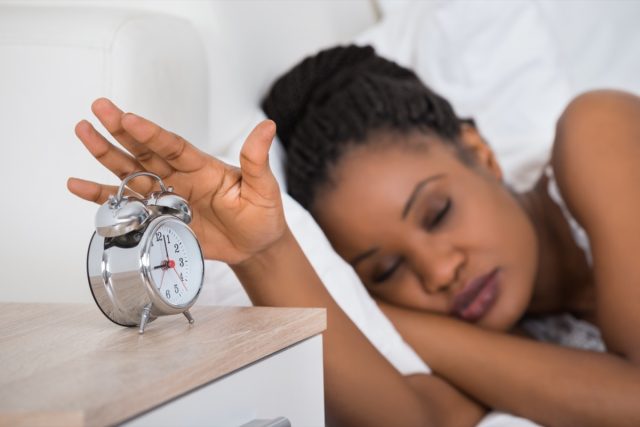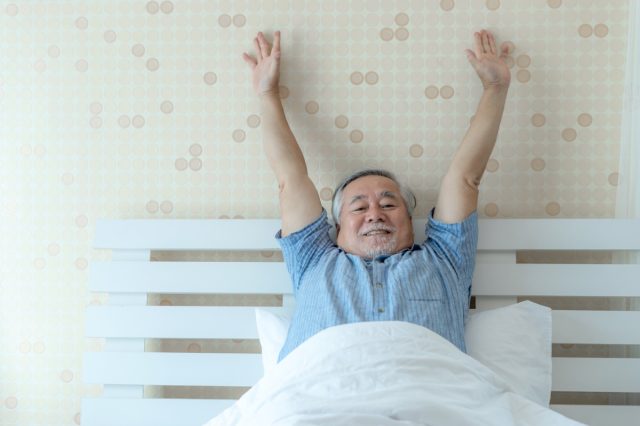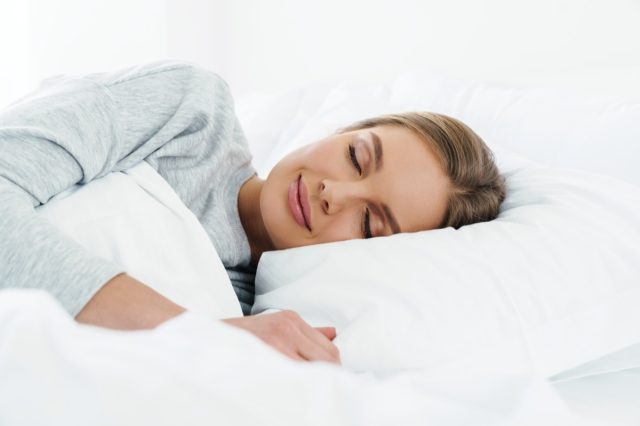Despite all of humanity's incredible inventions and medical advancements, we still can't help the fact that each one of us grows just a little older every day. What you can control, however, is your mindset when it comes to aging. If you've already convinced yourself that life after the age of 50 or 60 is going to be a drag, chances are, your prediction will come true.
On the other hand, believing that a healthy, productive life in old age is possible and attainable can make a world of difference. The problem is so many people mistakenly fall for the narrative that it's "all downhill from here" past a certain age. And hey, no one is saying it's easy. But positivity in reference to aging can be an especially difficult task, especially on those mornings when your back is aching more than usual.
Interestingly, new research conducted at the University of Exeter and published in the scientific journal Behavioral Sleep Medicine has uncovered a fascinating link between sleep patterns and self-perceptions of aging.
Poor sleep may leave you feeling older

The research team reports there is a notable association between poor sleep and feeling older in general. Furthermore, inadequate sleep patterns are also linked to more negative perceptions of aging.
Over 4,400 older adults over the age of 50 took part in this study, and those reporting the worst sleep patterns/quality not only felt older but also displayed a much more negative mindset in reference to their own physical and mental aging. As touched on earlier, a pessimistic view on aging can have serious negative implications on one's cognitive, physical, and overall health as the years go by.
For example, let's say 56-year-old Jerry hasn't been sleeping well lately. Well, when Jerry wakes up tomorrow and can't move his neck this research suggests he'll be much more likely to react cynically and imagine himself in a wheelchair by the age of 65.
The right mindset makes all the difference

The importance of sleep at any age is well-documented, but it's especially important for older adults to attain 7-8 hours of shuteye on a nightly basis. Sleep is a time for our bodies and minds to rest and recharge, and that's of the utmost importance for an aging individual. For instance, this study published in Science Advances tells us that deep sleep is when our brains take out the neural trash and eliminate toxic proteins linked to dementia and Alzheimer's.
Now, this new research is providing yet another reason for all older adults to address their sleep difficulties.
"As we age, we all experience both positive and negative changes in many areas of our lives. However, some people perceive more negative changes than others. As we know that having a negative perception of aging can be detrimental to future physical health, mental health, and cognitive health, an open question in aging research is to understand what makes people more negative about aging. Our research suggests that poor sleepers feel older, and have a more negative perception of their aging," explains lead study author Dr. Serena Sabatini.
The research

All 4,482 individuals over the age of 50 who took part in this study were enrolled in the larger PROTECT Study, which is an ongoing online project aimed at understanding how to stay sharp cognitively in old age via a series of cognitive tests and lifestyle polls completed periodically by participants.
Study authors noticed that many PROTECT participants were mentioning sleep issues in their responses. One subject submitted the following comment: "How I feel fluctuates widely depending on my sleep. I feel great if I get six hours so about half the time I feel younger and half the time I feel older!" Another person said, "I have chronic pain problems and get very little sleep which impacts my life quite a lot."
So, in response to all of these sleep-related comments, the research team decided to put together a survey focusing specifically on sleep. Besides sleep-related questions, the questionnaires also asked about any detrimental age-related changes such as vision deterioration, poorer memory, less energy, more dependence on others, and decreased motivation. After completing the sleep-centric survey once, all participants filled out the same questionnaire one full year later.
More research is warranted

This study is ultimately observational in nature and thus can not definitively establish causation.
"We need to study this further–one explanation could be that a more negative outlook influences both. However, it could be a sign that addressing sleep difficulties could promote a better perception of aging, which could have other health benefits," Dr. Sabatini comments.
Study authors plan on conducting further research on this topic, which will hopefully uncover the main driving force behind the association between sleep and aging perceptions/mindset. Still, these findings should be more than enough motivation for all of us to start prioritizing sleep. The next time you're feeling especially old and decrepit, a simple nap may be all it takes to start feeling younger!
"This research is an important part of the growing body of evidence about the crucial role of sleep in healthy aging," concludes Professor Clive Ballard of the University of Exeter.
No comments:
Post a Comment